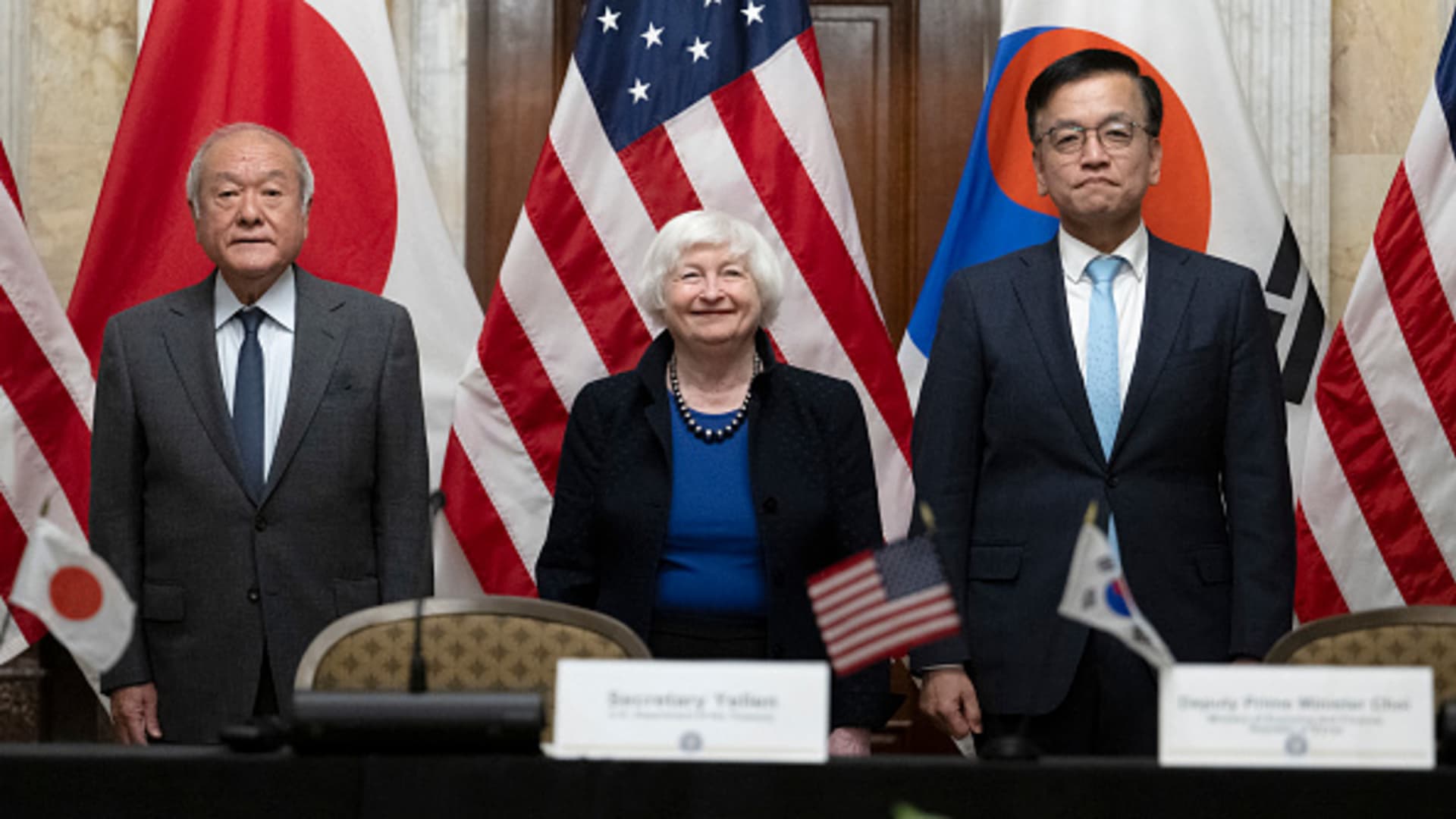
This is CNBC's live blog covering Asia-Pacific markets.
Asia-Pacific markets climbed across the board Thursday, in contrast with Wall Street's overnight losses which saw the S&P 500 and the Nasdaq Composite fall for a fourth straight day.
Tech stocks led markets lower as artificial intelligence darling Nvidia fell nearly 4%, joined by Netflix, Meta, Apple and Microsoft. Tech was the worst-performing S&P 500 sector, falling 1.7%.
Investors are "trimming some of the high fliers," said Kevin Gordon, senior investment strategist at Charles Schwab. "I think investors are really starting to catch on to the fact that there are other parts of the market that are doing well."
Get Tri-state area news and weather forecasts to your inbox. Sign up for NBC New York newsletters.
Investors in Asia will assess Australia's unemployment rate, which is one of the metrics the country's central bank weighs when considering monetary policy.
Australia's S&P/ASX 200 climbed 0.48% to close at 7,642.1, snapping a five-day losing streak as the country's unemployment rate inched up to 3.8% in March, less than the 3.9% expected by Reuters.
South Korea's Kospi rebounded from Wednesday's losses and led Asian markets, advancing 1.95% and ending at 2,634.7. The small-cap Kosdaq gained 2.72% to finish at 855.65.
Money Report
Japan's Nikkei 225 reversed earlier losses and closed 0.31% up at 38,079, ending a three-day losing streak, while the broad-based Topix advanced 0.54% to 2,677.45
Hong Kong's Hang Seng index climbed 1%, while the mainland Chinese CSI 300 traded up 0.12% to end at 3,569.8.
On Wednesday in the U.S., all three major indexes lost ground, with the Dow Jones Industrial Average recording its seventh negative session in the last eight, along with the losses in the other two major indexes.
The 30-stock Dow lost 0.12%, while the S&P 500 shed 0.58% and the Nasdaq Composite tumbled 1.15%.
— CNBC's Sarah Min and Alex Harring contributed to this report.
BOJ board member says future rate hikes in Japan are likely to be slow
Bank of Japan board member Asahi Noguchi said the pace of hikes for the central bank will be "much slower" than those of its global peers.
Noguchi said in a speech in Saga prefecture that it will take "a considerable amount of time" for prices to rise sustainably to the Bank of Japan 2% target rate, according to a Google translation of the speech.
Noguchi also said he opposed the lifting of the negative interest rate policy, saying that the BOJ should "confirm the reality of the strengthening of the virtuous cycle between wages and prices."
Back in March, Noguchi was one among two dissenters on the BOJ's board when the bank abolished its yield curve control and ended its negative interest rate policy.
He said the central bank should avoid the risk of bringing about "discontinuous changes in financial conditions" until this "virtuous cycle" is more confirmed.
— Lim Hui Jie
Australia unemployment inches up to 3.8% in March, below expectations
Australia's seasonally adjusted unemployment rate inched up to 3.8% in March from 3.7% in February, but the figure was still lower than the 3.9% expected by economists polled by Reuters.
The Australian Bureau of Statistics said 6,600 people went out of employment, a surprise compared to the 10,000 gain expected by Reuters.
As such, the participation rate in Australia fell to 66.6%, down marginally from the 66.7% seen in February.
— Lim Hui Jie
Asia airline stocks gain as oil prices decline more than 3%
Airline stocks in Asia soared as oil prices sunk more than 3%, due to higher-than-expected U.S. inventory.
South Korean carrier Asiana Airlines led Asian airlines, up almost 4%, while counterpart Korean Air posted a 3.23% gain.
Australian flag carrier Qantas was up almost 3.8%, while Japan's ANA and Japan Airlines climbed 1.53% and 2.8%, respectively.
Other airlines posted smaller gains, such as Cathay Pacific and Singapore Airlines, which were up 1% and 0.48%, respectively.
— Lim Hui Jie
U.S. acknowledges Japan and South Korea's 'serious concerns' on currency
The U.S. acknowledged Japan and South Korea's "serious concerns" over the recent sharp depreciation in both the yen and the won. All three sides agreed to "consult closely on foreign exchange market developments."
This comes after the first trilateral meeting between the top finance officials of the three countries.

The Japanese yen recently reached its weakest level against the U.S. dollar in 34 years, and is currently trading at 154.26.
The South Korean won has also reached its weakest level against the greenback in about 18 months, currently trading at 1,377.11.
— Lim Hui Jie
Morgan Stanley, HSBC cutting Asia investment banking jobs this week: Reuters
Morgan Stanley and HSBC are cutting dozens of investment banking jobs in the Asia-Pacific region this week, according to a Reuters report.
Citing sources, Reuters said this comes as the two banks ramp up cost-cutting, with weaker deal-making and sluggish markets in China and Hong Kong weighing on business prospects.
Morgan Stanley is cutting at least 50 investment banking jobs in the region starting this week, according to the report, affecting around 13% of its Asia investment banking workforce of 400.
HSBC reportedly started layoffs on Tuesday, and around 30 dealmakers are expected to leave the company.
— Lim Hui Jie
CNBC Pro: Loads of analysts cut their price targets on these 10 stocks ahead of earnings
Analysts have lowered their expectations on several global stocks this week by cutting their price targets.
The price target changes come ahead of the next earnings season covering the first quarter of this year.
CNBC Pro screened for global stocks in the MSCI World index that have received price target downgrades over the past seven days and are yet to report earnings.
CNBC Pro subscribers can read more about the 10 stocks here.
— Ganesh Rao
Next few weeks have 'further downside risk,' BTIG says
BTIG's Jonathan Krinsky is still expecting the market to turn lower in the longer term.
"Another messy open with breadth opening very strong with ~85% upside volume, falling down to 70%. We continue to think the next few days should be higher, while the next few weeks have further downside risk," Krinsky said in a Wednesday note.
He noted that while the Nasdaq 100 broke Tuesday's low, the S&P 500 and Russell 2000 indexes did not. The CBOE Volatility Index remains in the red, he added. He is also cautious on semiconductors, noting that the VanEck Semiconductor ETF (SMH) is trying to break its 50-day moving average.
— Pia Singh
Oil falls more than 3% despite war risk: 'Peace may have come to an end, but oil continues to flow'
Crude oil futures fell more than 3% Wednesday as the market dismissed the risk of a wider war between Israel and Iran that could disrupt supplies.
The West Texas Intermediate contract for May delivery lost $2.76, or 3.23%, to $82.60 a barrel. June Brent futures were down $2.87, or 3.19%, at $87.15 a barrel. U.S. oil and the global benchmark are down more than 3.5% for the week.
"Theories of Iran-Israel tension disrupting oil supplies have fizzled out," said Manish Raj, managing director of Velandera Energy Partners. "Peace may have come to an end, but oil continues to flow," he said.
— Spencer Kimball
Fed report says economy grew 'slightly' in recent period
The U.S. economy grew "slightly" over the past six weeks while price increases moved at a "modest" pace and employment showed "slight" gains as well, the Federal Reserve said in its latest Beige Book report filed Wednesday.
In its periodic account of economic conditions, the central bank noted that consumer spending "barely increases" though spending on vehicles "was buoyed notably" in some areas. The report also noted that home sales "strengthened" across most areas and characterized the economic outlook as "cautiously optimistic."
On inflation, the report said the expectation was that it would "hold steady at a slow pace." Some manufacturers expect rising costs for both input and output prices.
— Jeff Cox






